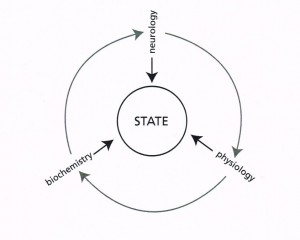by Robert Holmes
“We are offering options, choice and the possibility of planning a different future”
~Dr. Ian Snape, on the Nature of Coaching
In today’s wellness focused environment we see more working together between medical doctors, psychologists and life coaches. And that’s great. I have a client, let’s call him Paul, who has been clinically diagnosed with three separate and fairly serious mental disorders. He suffers from long bouts of euphoria followed by long bouts of depression, an inability to connect with his emotions and low grade social anxiety. Paul is exactly the sort of client a life coach can help, especially if they have a working knowledge of neuroscience.
 A person’s state affects every other part of their experience of life, and every state can be influenced, changed or affected. We move naturally from elation to depression and back again. There are three main inputs making up a person’s state: physiology, biochemistry and neurology. We have choice, freedom and the possibility of planning a different future by affecting change in these three elements in the diagram to the left:
A person’s state affects every other part of their experience of life, and every state can be influenced, changed or affected. We move naturally from elation to depression and back again. There are three main inputs making up a person’s state: physiology, biochemistry and neurology. We have choice, freedom and the possibility of planning a different future by affecting change in these three elements in the diagram to the left:
- Physiology looks at our breathing, stance, dress and movement.
- Biochemistry looks at what cocktail of chemicals are running around the blood stream, the way food affects mood, disease and medication.
- Neurology looks at beliefs, perceptions, neuroplasticity and the unconscious mind.
Paul’s rather serious mental health conditions are crippling his relationships, have damaged his finances and affected his world. He can work on 12 separate areas to positively change his state and alter his experience of life radically. This is not a 12 step program, but rather an account of some of the suggestions I made to Paul about influencing his state hour by hour and day by day. Let’s go through them briefly one by one.
Physiology
- Breathe deep
We started Paul with some deep breathing exercises. It relaxes the autonomic nervous system (ANS), bringing the parasympathetic (the brake) and sympathetic (the accelerator) into concert with each other. Deep breathing also relaxes the enteric nervous system (ENS) via deep vagal stimulation which assists digestion.
- Stand straight
This is an experiment I had Paul try in a long straight hall way. I invited him to shuffle down it, slightly hunched over, looking down like an old person. Then at the end, he turned around, stood upright, lifted his head and walked back with authority. Outward change affects inward experience dramatically.
- Dress for success
Just as smiling makes us happy and when we are happy we smile, dress can change our mood for the better. Paul was going for a job interview and dressing snappy gave him more confidence!
- Get moving
I suggested Paul take a walk every day. According to Dr John Arden (author of the Brain Bible) doing 30 minutes of moderate exercise a day has a more positive effect on depression than all of the anti-depressants on the market. It releases endorphins, which give a natural high.
Making these four changes to physiology is a great start. We will continue with the rest of the 12 ways to change internal state by looking at what changes Paul could make to positively impact his biochemistry and neurology in the next article.
SOURCES:
The diagram comes from Certificate I in Neurocoaching, copyright The Coaching Space 2014.
